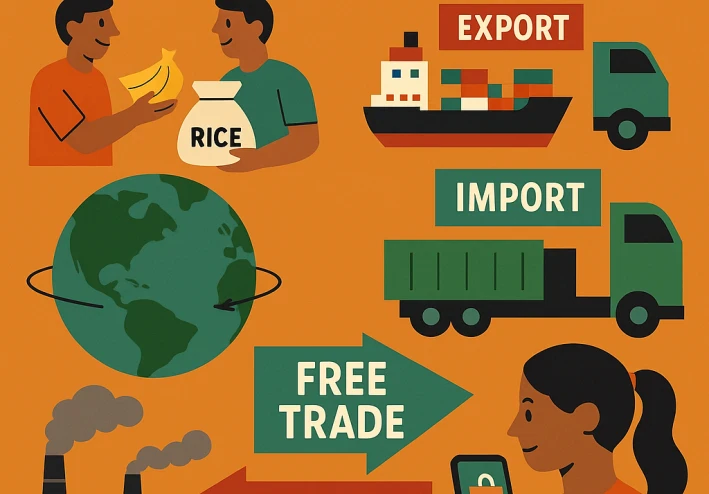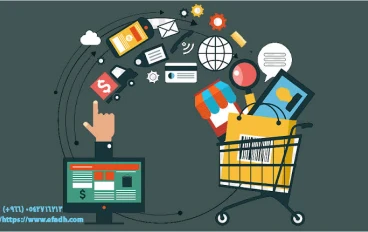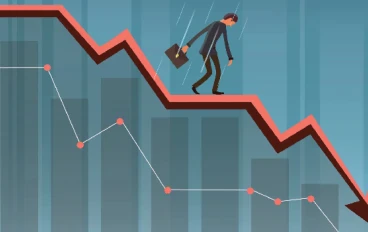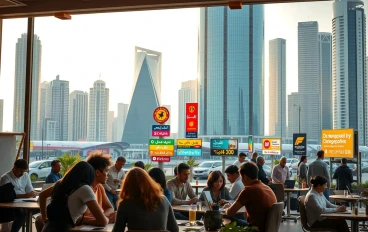
Why Trade Is Important in Our Daily Lives
Trade is something we all depend on, even if we don’t think about it much. Every time we buy clothes, food, or a phone, we’re part of a huge global system called trade. Trade means exchanging goods and services, either inside our country or with other countries. It’s been around since ancient times when people used to exchange things directly, like rice for salt. Today, it’s a lot more advanced, but the basic idea is the same.
Why Do We Trade?
The main reason people and countries trade is because no one has everything. Some countries are good at growing coffee, while others have oil or make strong cars. When countries trade, they can focus on what they’re best at and buy the things they need from others. This helps save time and money, and it also gives people access to more products.
Imagine living in a country that doesn’t grow bananas. Without trade, you’d never eat one. But thanks to trade, you can enjoy fruits, clothes, electronics, and other things from all over the world.
Different Kinds of Trade
There are two main types of trade. The first is local or domestic trade, which happens inside a single country. The second is international trade, which happens between countries. International trade is more complicated because countries have different rules, currencies, and laws.
When we export, we sell products to another country. When we import, we buy products from other countries. Both are important for keeping the economy healthy.
Free Trade vs. Protectionism
There are different opinions about how trade should work. Some people believe in free trade, where goods move between countries without many taxes or rules. Free trade can help businesses grow and make products cheaper for customers.
Other people believe in protectionism, which means adding taxes (called tariffs) to foreign products to protect local businesses. This can help some local companies, but it often makes products more expensive for everyone.
Global Trade Today
Today’s world is more connected than ever. Because of globalization, a product like a smartphone might be designed in the USA, have parts made in China and Korea, be put together in Vietnam, and sold in Egypt. This shows how countries work together to make and trade things.
But this system also has problems. If one country has a problem—like a natural disaster or a war—it can affect trade everywhere. That’s what happened during the COVID-19 pandemic when many businesses and supply chains were disrupted.
Problems and Challenges in Trade
Trade isn’t always perfect. There are some serious issues we need to think about:
- Unfair competition – Sometimes, cheap imports can hurt local businesses.
- Job loss – When factories move to cheaper countries, people in other places may lose their jobs.
- Pollution – Shipping goods across the world creates pollution and harms the environment.
- Rich vs. Poor – Sometimes big companies take advantage of workers in poor countries by paying them very little.
Trade Deals and Agreements
To keep things fair, many countries sign trade agreements. These agreements make rules that all countries involved agree to follow. Some of the most famous trade deals are between the U.S., Canada, and Mexico, and between European countries.
There are also big organizations like the World Trade Organization (WTO) that help solve trade arguments and try to keep trade fair for everyone.
What’s Next for Trade?
Trade is always changing. New technology is making it easier for even small businesses to sell their products online to other countries. This is called e-commerce, and it’s growing fast.
Also, more people care now about the environment, so there’s a push toward green trade, which means trading in a way that doesn’t hurt the planet. Some companies now try to ship products in eco-friendly ways or make sure their workers are treated fairly.
Conclusion
In the end, trade is a big part of our lives. It helps countries grow, gives us more choices, and connects people from different parts of the world. But it also needs to be done carefully so that it doesn’t hurt the planet or leave people behind. If countries work together and trade fairly, we can all benefit from it.






























